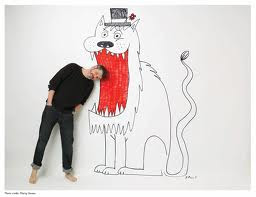I was privileged to be able to attend the 2013 SCBWI
international conference, where hundreds upon hundreds of authors,
illustrators, editors and agents of children’s literature meet for an
inspiring, educational and fun weekend of keynote speakers, dozens of workshop
sessions, portfolio showcases and other events.
There were 1,266 people in LA this year, making it the
second largest conference ever, second to the 40th two years ago.
Nine hundred and eighty eight of these attendees were women, so you can imagine
what planning had to go into bathroom breaks to avoid the knee crossing lines.
1,266 attendees = a lot of introverts
Lin Oliver started us out by announcing, “We are all nut
farmers here.” It truly is a nutty, frustrating and grueling business that
somehow speaks to our hearts.
Keynote Laurie Halse Anderson, author of “Speak,” encouraged
writers to “be brave today.” She said, “Books are proof humans can do magic.”
She also spit on the word trends, for which she was teased about the rest of
the conference.
She encouraged creators to turn off the internet, find your
muses, take time to create and find that inner child. All good advice, although
I would like you to ignore that the first thing I did upon coming home was
write a blog post for the internet. Yeah, that turning off the internet advice may
be harder for some people.
Her last piece of advice, about finding the child within,
was a theme across the conference. Keynote speaker after keynote speaker, from
comedians like Jon Scieszka and Matt Barnett to legends like Richard Peck
encouraged creators to find your audience, create, and enjoy what you are
doing. Anderson ’s spitting on
trends was not out of place. Writing for the trends was not encouraged, even by
the more serious agents and editors in workshop sessions. While knowing the
market can help when querying and trying to sell books, common advice was that it
should be completely ignored in the creative process. In essence, it seemed
that may be what editors were looking for after all, as both editors and agents
mentioned looking for something not seen before, a new voice, a new concept, a
new way to write literature.
Mo Willems, winner of Sid Fleischman award.
These conferences are often about making friends, and I did
make a friend with fellow resident cheesehead and first time attendee. We met a
fellow at the black and white ball whose story was published as an app by a
company in Milwaukee . I don’t know
how much money he will make off this app, as the market survey given to us was
not optimistic for that. He did have some fame among his peers, as it seemed
everyone knew this Tim McCanna, who writes music and sold “Teeny Tiny Trucks”
as a hardcover and an app to Little Bahalia Publishing in Milwaukee .
Now you know him too.
Everyone dreams of going to these conferences and making
that magic connection with an agent or editor and selling their work. In a way,
I felt a bit sorry for the agents and editors, as one of the first questions in
every of their knowledge sharing sessions was about how to submit to them. I
heard about deals being made, and I know it happens. That did not happen with
me. I went into a critique session with a manuscript I had written and revised
at least five or six times and didn’t know what to do with it anymore. I did
not come out with a promise of a contract, but I did get some incredible ideas
that turn it on its head and may, indeed, lead it into the excellence the
industry is looking for.
Or, it could turn it into a mess. I have to get off the
internet and play in the mud a bit to find out.
As for writing what you enjoy, my final workshop was on
writing humor, hosted by Lin Oliver and Henry Winkler. Watching those two
interact was comedy in the making, which is why those Hank Zipzer books are so
funny. They are based on Henry Winkler’s experiences as a child. During this
session, Lin suggested writing what you think is funny, using the example of
puns. She doesn’t think puns are funny and won’t write them. Someone raised a
hand and said that children love puns and they should be written for them.
Lin asked the audience to raise their hands if they loved
puns. Only a few brave souls raised their hands, knowing the greats before them
did not think they are funny. Lin gestured to the hands in the air, saying,
“Let them write the puns.”
I think that was the best advice ever. Write what you love.
Know the market when you query, but not when you create. Let someone else write
to the trends you don’t like. Make your own trends.


Thanks for posting this, Jill. Great ideas! I love"Know the market when you query, but not when you create." I'm so glad you were able to go.
ReplyDelete